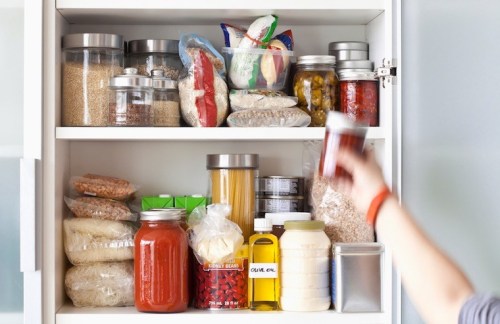When it comes to avoiding not-so-great stuff for your body, you’d think reading the nutrition label would be enough. But a new report from the Environmental Working Group shows that what your food and drinks are stored in is just as important to consider. EWG researchers found that over 16,000 grocery store items are in packaging containing BPA, a hormone-disrupting chemical.
“Bisphenol A, or BPA, is a female reproductive toxicant. There is evidence that BPA can mimic thyroid and sex hormones in animals and humans,” EWG database and research analyst Samara Geller tells Well+Good. “It’s also been associated with a host of other ills, including infertility, altered brain and nervous system development, behavioral changes in children, tooth enamel development, obesity, cancer, and heart disease.”
Scary, right? Keep reading for everything you need to know about BPA—and how to use EWG’s guide to protect yourself.
Why is BPA FDA-approved if it’s dangerous?
“Federal regulation of BPA is woefully inadequate, and the U.S. Food and Drug Administration continues to support the use of BPA in most food packaging—ignoring a multitude of scientific studies, including those with evidence of low dose effects,” Geller says. She adds that the FDA conducted a 90-day study in 2014 looking into the toxicity of BPA, but it was widely criticized for not investigating effects longer than three months. And their findings weren’t consistent with other studies.
“The FDA does say that it considers cumulative exposure to food contact substances that ‘can reasonably be expected to migrate’ into foods and beverages. It, however, fails to restrict the level of BPA allowed in any food packaging for children and adults,” Geller notes. The fear is enough that other countries have taken action. France, for example, restricts any trace of BPA in food packaging.
What are the worst culprits?
While BPA is in some things you can’t avoid, like drinking water and dust, it’s also found in things you can avoid, like canned goods. Geller says Goya and Campbell’s are two brands in particular that kept popping up again and again in EWG’s research about food and beverage packaging. Plastic containers and hard, clear baby bottles are other biggies.
What can you do to stay safe?
Totally freaked out? That’s pretty much why the EWG created their database, where anyone can search to see if a specific item has BPA in it. The database is huge, so whatever you are questioning, there’s a good chance it’s in there. Another tip from Geller: Purchase jarred, bottled, and canned food from makers that publicly state they use BPA-free packaging and make their replacement chemicals known.
And lastly, avoid canned food where possible—and that’s double-y important if you are pregnant or nursing. Instead, buy dried, frozen, and fresh food whenever possible. As if you needed another excuse to hit up the farmers’ market this weekend.
Ready for some happy food news? Find out why eating lentil salad can actually help the environment. And the FDA isn’t all bad: They’re actually improving nutrition labels in a huge, amazing, healthy way.
Sign Up for Our Daily Newsletter
Get all the latest in wellness, trends, food, fitness, beauty, and more delivered right to your inbox.
Got it, you've been added to our email list.









